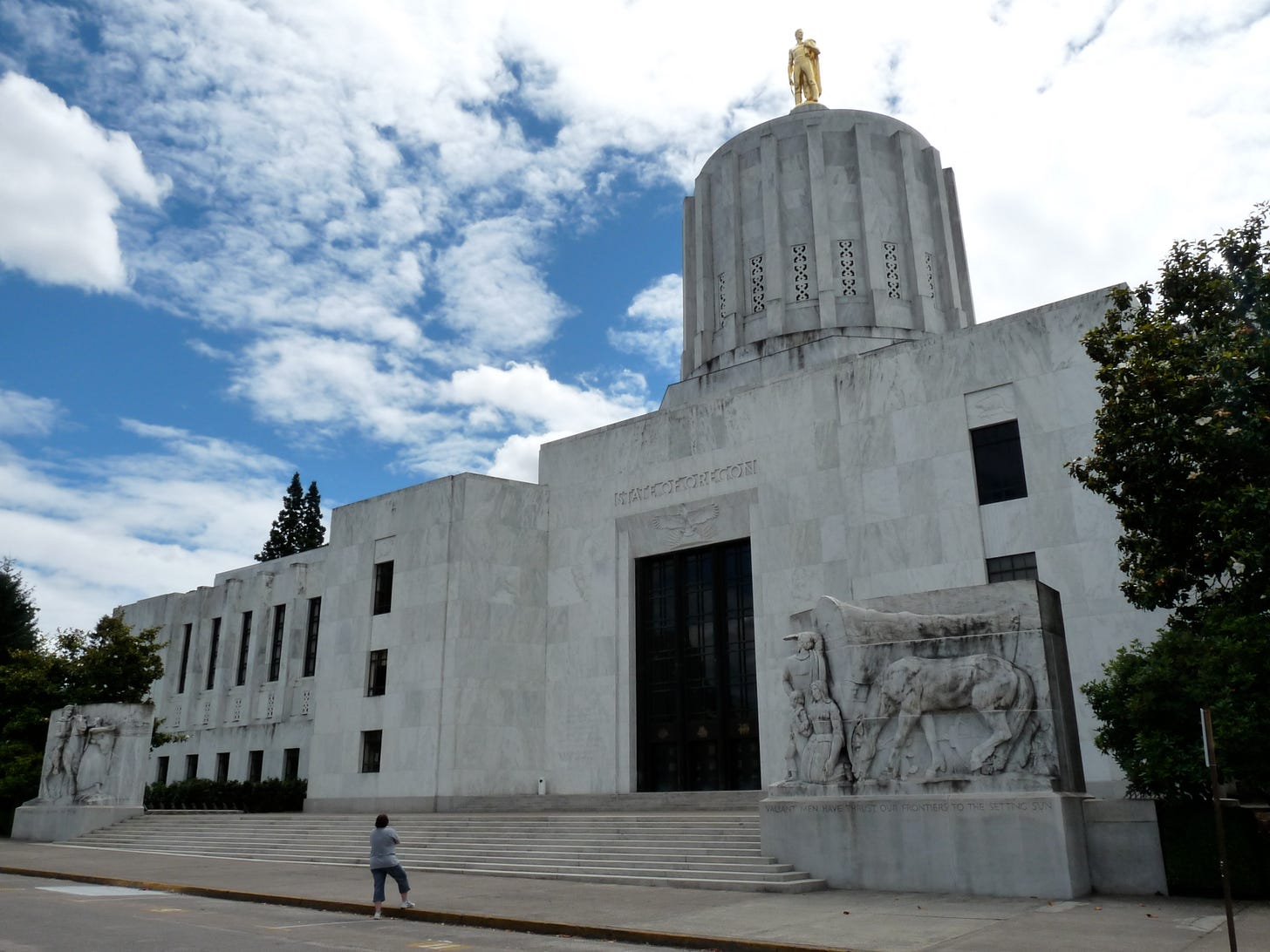The Liftoff: Housing, tolling, and what you need to know about the revenue forecast
PLUS: Agency leader refuses to answer legislator questions; snow and COVID-19 interrupt the legislature; the profound legacy of Vic Atiyeh; fight brewing over fossil fuel divestment; and more!
Welcome back to The Liftoff!
First, a note of appreciation. We have grown our readership a lot over the last year. We appreciate all of your comments, emails, shares and feedback. Please keep them coming!
You may also recognize a new contributor in the byline of The Liftoff. Kristina Edmunson is our new guest contributor. We’re excited to have her expertise in Oregon politics, news commentary, and state government. Welcome Kristina!
1. Recession, or no recession?
Two very different economic pictures emerged this week. One was from The Portland Business Alliance and the other from the state revenue forecast (which is issued four times a year). These competing reports lead to the question, are we—or aren’t we—in a recession? Here’s where things stand:
The Portland Business Alliance’s newest report, commissioned by ECONorthwest, on Portland’s economy doesn’t paint a rosy picture:
“Compared to other similarly-sized cities, Portland has lagged behind on recovering financially since 2020….while cities such as Austin and Salt Lake City saw their employment rates return to pre-pandemic levels by April 2021, Portland waited until July 2022,” reports Alex Zielinski of OPB.
“The report shows that tax burdens mean Portlanders of all incomes are bringing home less income after taxes than those living in neighboring cities, like Beaverton or Vancouver. At the same time, data also shows that Clark County in particular has seen a dramatic increase in household wealth in the past decade.”
But, state revenue experts told lawmakers Wednesday that fears of a recession are actually fading as Oregon’s tax revenue outpaces expectations.
That’s because it has been one of the best decades yet for the state, and taxpayers could see a record $4 billion kicker rebate.
The Oregon Capital Chronicle’s Julia Shumway shares details, writing “The state’s latest quarterly economic forecast estimates that lawmakers will have nearly $700 million more to spend than originally anticipated.”
Veteran Salem reporter Peter Wong breaks it down more, “Lawmakers will have almost $700 million more available than previously projected in tax collections in planning state budgets -- $489 million in the current cycle and $207 million in the 2023-25 cycle.
Former advisor to Governors Kitzhaber and Kulongoski (who both weathered economic storms), Tim Nesbitt, puts things into perspective in an opinion piece in The Capital Chronicle. Nesbitt writes, “The state’s reserves and ending balances now exceed a goal set after the Great Recession. At $6.5 billion, they represent 45% of the state’s annual General Fund budget, providing enough ballast to ride out the turbulence of all but the most severe recessions in the years ahead.”
2. With all this cash, will the state meet the Governor’s housing goal?
One of the biggest factors in Oregon’s budget and economic forecast is how (and if) the state will invest in more housing. Some economists estimate that Oregon is short more than 100,000 housing units.
Which is why Oregon lawmakers plan to spend almost $200 million to address housing and homelessness, including Governor Kotek’s full $130 million budget request. Proposed legislation would slow evictions and streamline home building permits. Chair of the House Committee on Housing and Homelessness, Rep. Maxine Dexter (D-Portland) spent the night in Salem hoping to make it to Thursday’s public hearing—but snow cancelled the hearing:

OPB’s Lauren Dake looks into how these housing bills could change housing in Oregon. For decades, Oregon made a name for itself as a pioneer in land use planning, but now lobbyists for housing developers and environmental conservationists want lawmakers to rethink how Oregon approaches development.
3. The profound legacy of Governor Vic Atiyeh with Jim Moore
Jim Moore is a well-known political commentator and the Director of Political Outreach for the Tom McCall Center for Civic Engagement at Pacific University. Moore also recently completed a soon-to-be released biography of Vic Atiyeh, the 32nd Governor of Oregon. This episode centers on Atiyeh’s tenure as Governor and some of the lasting impacts of his administration.
We cover how he managed through crisis (including the largest bioterrorism attack in US history and the Rajneeshee crisis in Wasco County) and the ways his legacy are still felt today. Moore helps us think through the similarities and differences between our current political environment (and current Governor) with Atiyeh and his tenure. Atiyeh was a special man who led Oregon during a challenging and fascinating period of history.
4. Sponsored Message from Harrang Long P.C.: Harrang Long’s Government Relations Practice
This message is from our sponsor, Harrang Long P.C.
The 82nd Legislative Assembly is well under way, with bills working their way through committees as even more bills are introduced. Action by this year’s legislature will touch the lives of every Oregon resident, business, non-profit, and local government. As a law firm, Harrang Long P.C. has always recognized that achieving our clients’ goals sometimes requires a change in the law. And in other situations, clients need help stopping or changing proposed amendments to the law that put their interests at risk.
For decades, we have played a role in shaping Oregon law on many subjects, from narrow regulations to major policy changes implicating billions of dollars. Our lawyers work with clients to draft legislation, prepare legal opinions and testimony to share with legislators, coordinate with professional lobbyists, and work directly with policymakers. To learn more about Harrang Long’s Policy and Politics Practice, click here.
5. Headlines from Salem
On Tuesday, ODOT and the Federal Highway Administration released the I-205 Toll Project Environment Assessment report. The first two bridges slated for upgrades are the Abernethy Bridge and the Tualatin Bridge, both along I-205. Both projects should have toll systems operating in the fourth quarter of 2024.
Speaking of ODOT, Willamette Week’s Nigel Jaquiss digs into ODOT’s ambitious agenda in Salem this year. Spoiler Alert: It includes the widening of I-5 at the Rose Quarter, the Interstate Bridge replacement, and tolling to help pay for the projects.
Secretary of State Shemia Fagan announced that state auditors will look at reproductive health care, the state’s approach to elder abuse, domestic violence and children’s mental health issue in the state’s 2023-24 Audit Plan.
Public employee unions and Sen. Republican Leader Tim Knopp (R-Bend), Sen. Kathleen Taylor (D-Portland) struck a deal that would ban the state from paying for work travel if the employee lives more than 60 miles from the state.
For the first time in three years, the Oregon Healthy Authority will start checking whether nearly 1.5 million people on Medicaid in Oregon are still eligible.
Other OHA news: Governor Kotek made Dana Hittle the permanent Medicaid director at OHA. The Oregon Health Plan covers 1.5 million low-income Oregonians, or about one in three residents, writes health reporter Ben Botkin.
Déjà vu all over again: last week, there were confirmed COVID exposures at the Capitol, according to the Oregon Capital Insider.
6. Why does Oregon have a public defender crisis?
A must read on Oregon’s public defense crisis: The Oregonian’s Aimee Green digs into why Oregon is losing public defenders. Two startling statistics from the article:
More than 700 defendants charged with crimes ranging from shoplifting to attempted murder and rape currently await court-appointed public defenders, and since last year
Multnomah County has dismissed more than 300 mostly non-violent criminal cases because of the lack of defense lawyers.
And it’s not just Oregon — states across the country are struggling with a lack of public defenders which is endangering public safety and also the right to an attorney.
7. Four stories causing controversy in state politics
First, from Willamette Week: ”Advocates for Fossil Fuel Divestment Push Treasury for Changes”
Next, from Pamplin: “Land use dispute snags semiconductor plan”
From the Capital Chronicle: Is (more) self-pumping of gasoline coming to Oregon?! A bipartisan coalition of legislators hopes so.
Lastly, a bizarre moment from Salem: Rep. David Gomberg repeatedly asked an agency leader about whether or not the agency was complying with a state law (which restricts betting on dog racing). The agency leader repeatedly refused to answer. WW has the weird story.
8. News Roundup: Why can’t Portland handle snow, job moves, and more!
Even the Portland Trailblazers plane was grounded at PDX for 7 hours Wednesday. Fortunately, Damian Lillard made a music video about the ordeal that went viral.
KGW took a snarky look at Portland’s long history of “coming to a screeching halt” when it snows. Will city leaders ever learn?
Another bad snow-related headline: “A Portland city commissioner banned tent, tarp distribution. Then it snowed 11 inches.”
Could an ultra-high-speed rail project extend to Eugene? Read more from OPB.
Oregon’s tuition-free community college program has failed to deliver on multiple goals, was the headline in this weekend’s The Oregonian.
Oregon elections officials have fined the Democratic Party of Oregon $35,000 for failing to disclose the cryptocurrency executive who gave the party $500,000. The party said last week they plan to fight it.
Former State Rep. Barbara Smith Warner (D-Portland) will be the next executive director of the National Vote at Home Institute. Former Secretary of State Phil Keisling chairs the nonpartisan organization, which promotes voting by mail, writes Dick Hughes.
Natalie King, Governor Kate Brown’s former Communications Director, is the new Senior Vice President of Communications for the Portland Trail Blazers.
From OPB: “Anti-LGBTQ activism goes unchallenged at the top of Crook County schools”
Thank you for reading.
Tips? Feedback? Ideas? Corrections? We want to hear from you! Email benjaminwbowman@gmail.com.
If you value this newsletter, please become a paying subscriber today. Your support will help us grow and offer more opportunities to this community. It’s just $10 a month!
Interested in advertising with us? Get in touch!
About the Authors
Ben Bowman is the state representative for Oregon House District 25 (Tigard, Metzger, and South Beaverton) and a member of the Tigard-Tualatin School Board. In his day job, he works as an administrator for a public school district. Previously, he worked as a legislative aide for former Reps. Margaret Doherty and Val Hoyle. He also co-hosts The Oregon Bridge podcast. In the newsletter and podcast, he speaks only for himself.
Alex Titus is a small business owner and consultant to businesses, nonprofits, and associations. Previously, he served as an Advisor in the Trump Administration and as a Policy Advisor to President Trump’s Super PAC. His writing has appeared in National Review, Fox News, The Hill, RealClearPolitics, and other publications.
Kristina Edmunson has been everything from press assistant for Governor Kulongoski, media advance associate for Vice President Joe Biden, and communications director for Attorney General Rosenblum. Born and raised in Eugene, she has been involved in some of the biggest and most controversial policy and legal decisions in Oregon over the last decade. She speaks only for herself in her contributions to The Liftoff.












